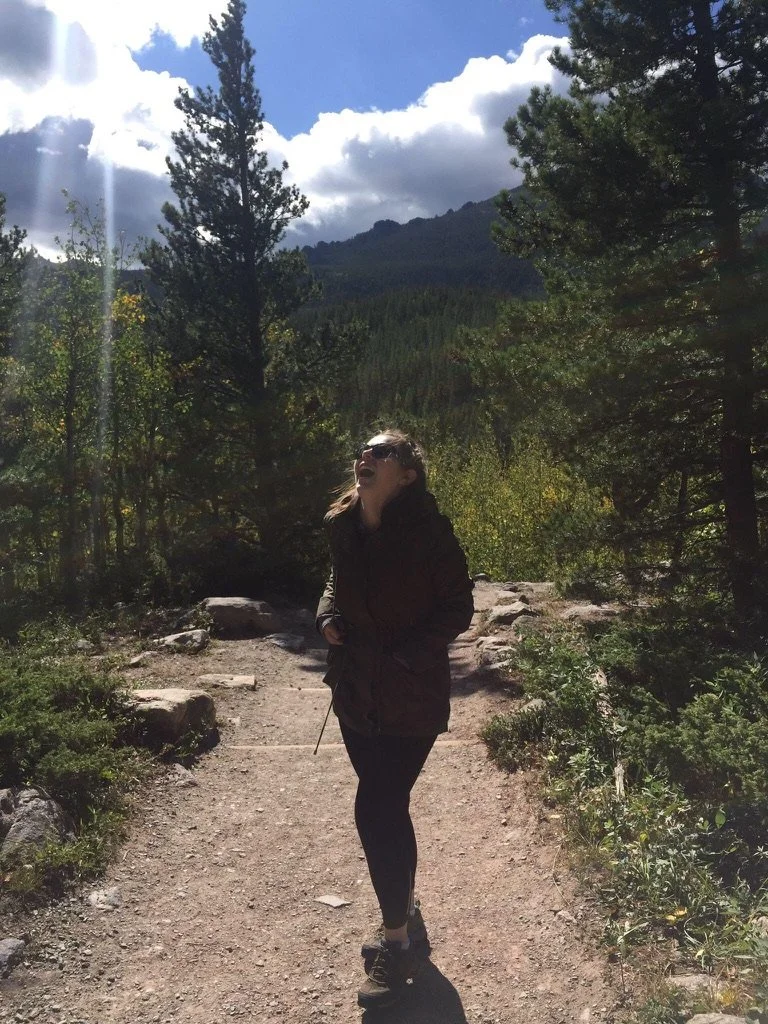how a therapist copes with anxiety
Here I am in Estes Park, Colorado - spending time in nature, laughing, meditating, and practicing joy. All of which help me manage my anxiety in the long term as a therapist!
Therapists are not immune to anxiety, depression, or any other diagnosis. In fact, most therapists choose their profession because of their own personal experiences with mental health. In training, therapists have more access to information about coping skills, distress tolerance, and emotional regulation that other folks may not have. As your favorite holistic therapist, I am sharing my top tips from my training for managing anxiety as a recovering people pleaser.
Daily Non-Negotiables:
Just like you can’t expect to go to the gym once to improve your cardiovascular fitness, you can’t do something once and expect it to improve your mental health. These daily non-negoitables build up your mental fortitude for everyday and emergency stressors. Every day, I focus on these tasks to charge my battery and fill up my emotional reserves:
Prioritizing on 8 hours of sleep so my brain can recover and build new synaptic connections
Intuitively eating three meals with snacks to keep my energy up
Drink water throughout the day to stay hydrated
Go outside for at least ten minutes to sit in the sun and put my feet in the grass
Meditate for at least ten minutes
Schedule breaks and leave space in my daily planner
Remove one thing from my to-do list or schedule every week
Take my medication and vitamins (Thank goodness for store bought neurotransmitters)
Text with my family and/or friends about non-work related things
Practice being mindful and nonjudgmental in my thinking (A simple, but never easy, task)!
Embrace feeling any emotion throughout the day, which sometimes means laughing or crying as needed
Regularly setting and reinforcing boundaries with people, places, and things that are not aligned with my highest values
Attending my own therapy sessions weekly
Go to hot yoga! Even if I just lay in a child's pose, being among a supportive community and moving my body is therapeutic after a tough anxiety day.
You may be looking at this list thinking that there is nothing special or revolutionary about it, and you would be correct. There is no magic pill, specific routine, or elusive equation! Small, consistent behaviors over time make a massive difference in the quality of your life. You did not develop anxiety in one night, and the skills you need to cope with it are not developed in one night either.
Emergency Tips for Panic Attacks or Intense Bouts of Anxiety:
Grounding using the five senses: What are five things you see? Four things you can feel? Three things you can hear? Two you can smell? One thing you can taste?
Taking a hot or cold shower to literally wash off situations, emotions, and unhelpful thoughts
Holding an ice cube in my palm until it fully melts helps to "shock" the nervous system away from the panic
Alternating between hot and cold drinks while noticing the taste in my mouth
Focusing on my breathing, exhaling for longer than inhaling, when I get overwhelmed
Brain dump lists that include what I can do, and what I have no control over
Doing ten jumping jacks, wall pushes, or ten burpees or dancing around my room to shake off excess energy
Sitting in a cool, dark room to take a break from the stressful situation
Riding through the wave of emotions - allowing myself to cry, be angry, etc.
Taking a break from the situation to ground/distract before returning to deal with the feelings
These tips are best suited for short term, intense feelings that create enough relief for you to better think and evaluation the situation. However, the goal is always to help you need to rely on your coping skills less by addressing the root of the issue in ongoing individual therapy.
In closing, I may be a therapist who specializes in anxiety, but I am also a human being that struggles with anxiety. Some days I have better success managing the symptoms than others just like anyone else.
What else would you add to this list? Let me know your favorite tips for managing anxiety in the comments below.
